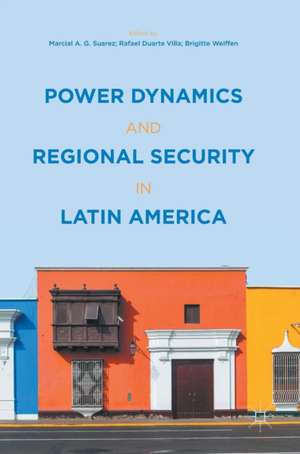Power Dynamics and Regional Security in Latin America
Editat de Marcial A.G. Suarez, Rafael Duarte Villa, Brigitte Weiffenen Limba Engleză Hardback – 3 aug 2017
This volume explores the repercussions of a changing world order on regional security in Latin America. It examines how global and regional power shifts impact on the evolution of regional institutions as well as on state policies adopted in response to regional security challenges such as border conflicts, political instability, migration, drug-trafficking, organized crime, and terrorism.
Contributions to this volume analyze the topic from three angles: power dynamics and its effects on regional security governance; the contribution of regional institutions to the management of security challenges; and the impact of power dynamics on states’ shifting security priorities.
Written by specialists from Brazil, Argentina, Colombia, Mexico, the United States and Europe, the chapters weave theory and case studies to provide a rich description of the impact of power and politics on regional security in Latin America. This book is an invaluable resource for students, scholars and practitioners interested in Latin American politics, regional cooperation, and war and conflict studies, as well as international security and international relations in general.
Preț: 733.03 lei
Preț vechi: 893.93 lei
-18% Nou
Puncte Express: 1100
Preț estimativ în valută:
140.26€ • 146.46$ • 115.83£
140.26€ • 146.46$ • 115.83£
Carte tipărită la comandă
Livrare economică 15-29 aprilie
Preluare comenzi: 021 569.72.76
Specificații
ISBN-13: 9781137573810
ISBN-10: 1137573813
Pagini: 289
Ilustrații: XVII, 355 p. 4 illus.
Dimensiuni: 148 x 210 mm
Greutate: 0.6 kg
Ediția:1st ed. 2017
Editura: Palgrave Macmillan UK
Colecția Palgrave Macmillan
Locul publicării:London, United Kingdom
ISBN-10: 1137573813
Pagini: 289
Ilustrații: XVII, 355 p. 4 illus.
Dimensiuni: 148 x 210 mm
Greutate: 0.6 kg
Ediția:1st ed. 2017
Editura: Palgrave Macmillan UK
Colecția Palgrave Macmillan
Locul publicării:London, United Kingdom
Cuprins
Chapter 1: Re-thinking Latin American Regional Security: The Impact of Power and Politics Brigitte Weiffen and Rafael Duarte Villa.- Part I: Power Shifts and Regional Security Governance.- Chapter 2: Regional Security in Latin America after United States Hegemony.- Joseph S. Tulchin.- Chapter 3: Security Governance in Latin America Roberto Dominguez.- Chapter 4 : Security Community or Balance of Power? Hybrid Security Governance in Latin America Rafael Duarte Villa.- Chapter 5: Role Theory and Geopolitical Thinking in South America Leslie E. Wehner and Detlef Nolte.- Part II: Regional Institutions and the Management of Security Challenges.- Chapter 6 : Regional Organizations, Conflict Resolution and Mediation in Latin America Monica Herz, Maira Siman and Ana Clara Telles.- Chapter 7: Is Regionalism Still a Viable Option for the Creation and Maintenance of Peace and Security in Latin America? Kai Enno Lehmann.- Chapter 8: Institutional Overlap and Responses to Political Crises in South America Brigitte Weiffen.- Chapter 9: Interstate Conflict Management in South America: The Relevance of Overlapping InstitutionsMarcos Valle Machado da Silva.- Part III: Power Shifts and Security Priorities.- Chapter 10 : The Zone of Violent Peace David R. Mares.- Chapter 11: Defense Management in South America: Bureaucracy and Diplomacy Rut Diamint.- Chapter 12: Counterterrorism Policies in Brazil: A Securitization Syndrome? Marcial A.G. Suarez, Fernando L. Brancoli and Igor D.P. Acácio.- Chapter 13 : Desecuritizing the ‘War on Drugs’ Carolina Cepeda Másmela and Arlene B. Tickner.- Chaptern 14: Mexico and Its Role in North America’s Security: Between Terrorism and Organized Crime Raúl Benítez Manaut.
Recenzii
Notă biografică
Marcial A. G. Suarez is Assistant Professor of Political Science and International Relations at Fluminense Federal University in Rio de Janeiro, Brazil and former research fellow of the International Security Program, Belfer Center, Harvard University.
Rafael A. D. Villa is Associate Professor of International Relations at the Department of Political Science and the Institute of International Relations at University of São Paulo (USP), Brazil. He also directs the International Relations Research Center at USP.
Brigitte Weiffen holds the Martius Chair for German and European Studies, a visiting professorship funded by the German Academic Exchange Service (DAAD), at the Department of Political Science, University of São Paulo, Brazil. Previously, she was an Assistant Professor at the University of Konstanz, Germany.
Rafael A. D. Villa is Associate Professor of International Relations at the Department of Political Science and the Institute of International Relations at University of São Paulo (USP), Brazil. He also directs the International Relations Research Center at USP.
Brigitte Weiffen holds the Martius Chair for German and European Studies, a visiting professorship funded by the German Academic Exchange Service (DAAD), at the Department of Political Science, University of São Paulo, Brazil. Previously, she was an Assistant Professor at the University of Konstanz, Germany.
Textul de pe ultima copertă
This volume explores the repercussions of a changing world order on regional security in Latin America. It examines how global and regional power shifts impact on the evolution of regional institutions as well as on state policies adopted in response to regional security challenges such as border conflicts, political instability, migration, drug-trafficking, organized crime, and terrorism.
Contributions to this volume analyze the topic from three angles: power dynamics and its effects on regional security governance; the contribution of regional institutions to the management of security challenges; and the impact of power dynamics on states’ shifting security priorities.
Written by specialists from Brazil, Argentina, Colombia, Mexico, the United States and Europe, the chapters weave theory and case studies to provide a rich description of the impact of power and politics on regional security in Latin America. This book is an invaluable resource for students, scholars and practitioners interested in Latin American politics, regional cooperation, and war and conflict studies, as well as international security and international relations in general.
Caracteristici
Explores the repercussions of world politics on Latin American regional security Studies the emergence of new and overlapping regional organizations Brings together contributions from Latin American, North American and European experts and introduces to an international audience several Latin American specialists whose work so far has mainly been published in Spanish or Portuguese












